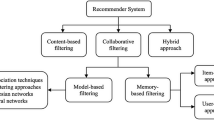Abstract
There are many different cloud services available, each with different offerings and standards of quality. Choosing a credible and reliable service has become a key issue. To address the shortcomings of existing evaluation methods, we propose a service clustering method based on weighted cloud model attributes. We calculate user-rating similarity with the weighted Pearson correlation coefficient method based on service clustering, and then compute user similarity combined with the user service selection index weight. This method allows us to determine the nearest neighbors. Finally, we obtain the recommended trust of the service for the target user through the recommendation trust algorithm. Simulation results show that the proposed algorithm can more accurately calculate service recommended trust. This method meets the demand of users in terms of service trust, and it improves the success rate of user service selection.
Similar content being viewed by others
References
Shang, G., Wang, Z.P., Liu, Q.B., et al., Towards an accurate evaluation of quality of cloud service in serviceoriented cloud computing, J. Intell. Manuf., 2014, vol. 25, no. 2.
Wu, M.L., Chang, C.H., and Liu, R.Z., Integrating content-based filtering with collaborative filtering using coclustering with augmented matrices, Expert Syst. Appl., 2014, vol. 41, no. 6.
Cao, J., Zeng, G.S., and Jiang, H.W., Service trust cloud environment perception of the trusted dynamic scheduling method, J. Commun., 2014, vol. 11, no. 11, pp. 42–45.
Zhang, G.W., Li, D.Y., and Li, P., Collaborative filtering recommendation algorithm based on cloud model, J. Software, 2007, vol. 10, no. 10, pp. 2405–2409.
Ahmed, S.I. and Sharmin, M., A trust based secure service discovery (TSSD) model for pervasive computing, J. Comput. Commun., 2008, vol. 31, no. 18, pp. 4281–4293.
Singh, S. and Chand, D., Trust evaluation in cloud based on friends and third party’s recommendation, Engineering and Computational Sciences (RAECS), 2014, pp. 1–6.
Das, A. and Islam, M.M., Secured trust: A dynamic trust computation model for secured communication in multiagent systems, IEEE Trans. Dependable Secure Comput., 2012, vol. 9, no. 2, pp. 261–274.
Wang, S.G., Sun, Q.B., and Yang, F.C., In the web service selection credibility evaluation method, J. Software, 2012, vol. 23, no. 6, pp. 1350–1367.
Wang, G. and Gui, X.L., Selecting a trust computing for transaction nodes in online social networks, Chin. J. Comput., 2013, vol. 36, no. 2, pp. 368–383.
Deng, A.L., Zhu, Y.Y., and Shi, B.L., Collaborative filtering recommendation algorithm based on project score predicts, J. Software, 2003, vol. 14, no. 9, pp. 1621–1628.
Li, Z.Y. and Wang, R.C., The dynamic security of P2P e-commerce environment trust management model, J. Commun., 2011, vol. 3, no. 3, pp. 51–58.
Brandic, I., Dustdar, S., Anstett, T., et al., Compliant cloud computing (C3): Architecture and language support for user-driven compliance management in clouds, Proceedings of the IEEE Cloud Computing, 2010, pp. 244–251.
Malik, Z. and Buguettaya, A., RATEWeb: Reputation assessment for trust establishment among web service, VLDB J., 2012, vol. 18, no. 4, p. 885–911.
Masri, E. and Mahmoud, Q.H., Toward quality-driven web service discovery, ITProf., 2008, vol. 10, no. 3, pp. 24–28.
Li Dy, Artificial Intelligence with Uncertainty, Beijing: National Defense Industry Press, 2005, pp. 171–177.
Li Dy and Liu Cy, Study on the universality of the normal cloud model, Eng. Sci., 2004, vol. 6, no. 8, pp. 28–34.
Sarwar, B., Karypis, G., and Konstan, J., Item-based collaborative filtering recommendation algorithms, Proceedings of the 10th International World Wide Web Conference, New York, 2001, pp. 285–295.
Shardanand, U. and Maes, P., Social information filtering: Algorithms for automating ‘Word of Mouth,’ Proceeding of the Conference on Human Factors in Computing Systems, 1995, pp. 210–217.
Zhu, R., Wang, H.M., and Feng, D.W., Based on the preference of credible service is recommended, J. Commun., 2011, vol. 22, no. 5, pp. 852–864.
Xiao, G., Wu, L.Q., Zhang, Y.M., et al., A web service trust evaluation approach based on collaborative frequency clustering, J. Zhejiang Univ. Technol., 2014, vol. 42, no. 4, pp. 393–399.
Author information
Authors and Affiliations
Corresponding author
Additional information
The article is published in the original.
About this article
Cite this article
Yu, Zy., Wang, Jd., Zhang, Hw. et al. Services recommended trust algorithm based on cloud model attributes weighted clustering. Aut. Control Comp. Sci. 50, 260–270 (2016). https://doi.org/10.3103/S0146411616040106
Received:
Accepted:
Published:
Issue Date:
DOI: https://doi.org/10.3103/S0146411616040106




